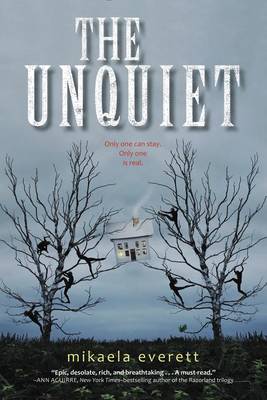Reviewed by celinenyx on
But first, the story itself.
Lira grows up in the cottages. She is from Earth II, the version of earth that is slowly disappearing. She and other children are being trained as sleepers on a special mission on Earth I. Slowly, it becomes clear what their mission truly encompasses.
Mythology-wise, The Unquiet leans heavily on the parallel-universe concept which was central to the TV show Fringe. Everything from the alternates, to one earth falling apart while the other lived on, reminded me of Fringe. Probably because I love that show so much and have watched it too many times, but still. Obviously the version in The Unquiet isn't a carbon copy, but sometimes I wished it distinguished itself more from its source material, especially because the book provides very little world building in itself. It's never explained why there are two parallel universes, or why the portals between them have formed. Or even more importantly, how can alternates talk to each other on the phone? Lira is not a scientist, but I would have liked some more insights into this.
The strongest point of The Unquiet is probably its atmosphere. The lyrical writing-style evokes a sort of dream-like state, and little pieces of the story are unveiled in a sequence that is not necessarily chronological. Lira's thoughts are incredibly dark, and the result is a bleak story with only a few pin-pricks of happiness to carry us through. Unlike the deluge of dystopians we've had the last few years, there is no focus on romance. There isn't even a romantic subplot until very late in the book (think last quarter), and even then, it fits naturally in the story. Overall, the story is pervaded with this gritty sense of realness, and the plight of Lira's tough life.
Having discussed the story itself, which is actually pretty good, I'll now turn towards what I think is highly problematic. If you want to be completely surprised about what the main part of the book is about, it might be a good idea to stop reading. The following doesn't contain any spoilers for specific events, but it does say about about the direction the book takes after Lira leaves the cottages.
The main question, so to speak, of The Unquiet is whether someone who does bad things can still be a good person. And with bad things, I mean kill innocent people. With bad things, I mean knowingly participate in the systematic extermination of people. See where I'm going with this? The question is, can someone who participates in a genocide be a good person?
And this book says yes. This book says, if you're trained to do this, if you're broken beyond repair, if you rebel in the tiniest way possible and save a handful of people while you kill dozens of others, you are a good person.
The only thing I could think of in my head was that this book would say that people in the SS are good people.
I don't care what you're trained to do. I don't care that you want to survive. I don't care that you're part of this system. Honestly, if you participate in the genocide because of all the pressure exerted on you, I can to a certain extent even understand. BUT THAT DOES NOT MAKE YOU A GOOD PERSON. YOU ARE NOT A GOOD PERSON. It means you have decided that the life of yourself, and maybe the lives of some people you love, are worth more than the dozens, maybe even hundreds of lives you take with your own hands.
There are always other options, and I hated the characters in The Unquiet for not considering them. I hated that they were passive, that they did what was asked of them, and that they didn't try to change the system in a meaningful way. I didn't care whether they'd succeed or not, I just wanted them to try.
Because in the end, I simply cannot accept them being "good people". They're not. And I don't like the author for making that connection.
Reading updates
- Started reading
- 8 October, 2015: Finished reading
- 8 October, 2015: Reviewed
